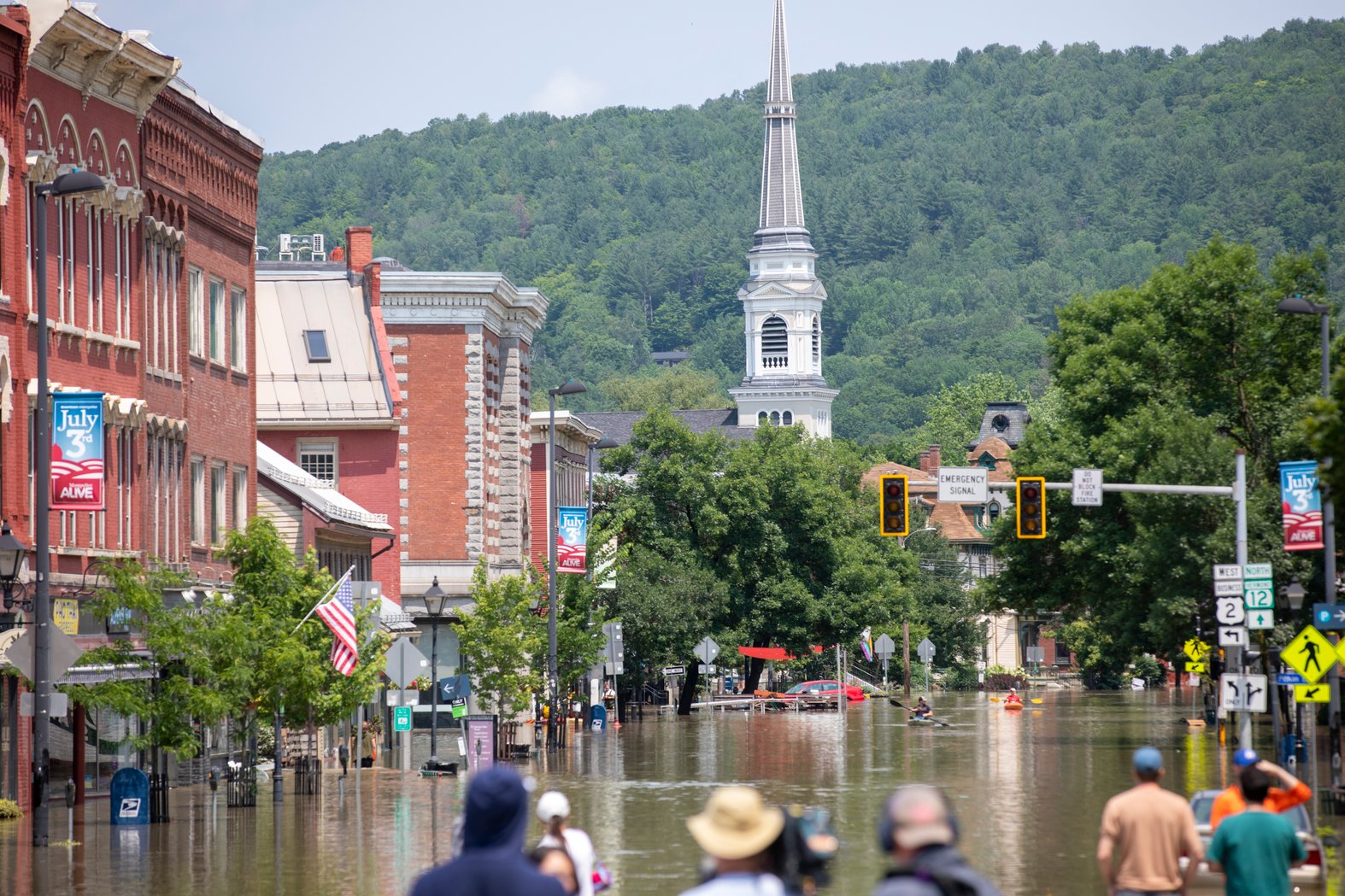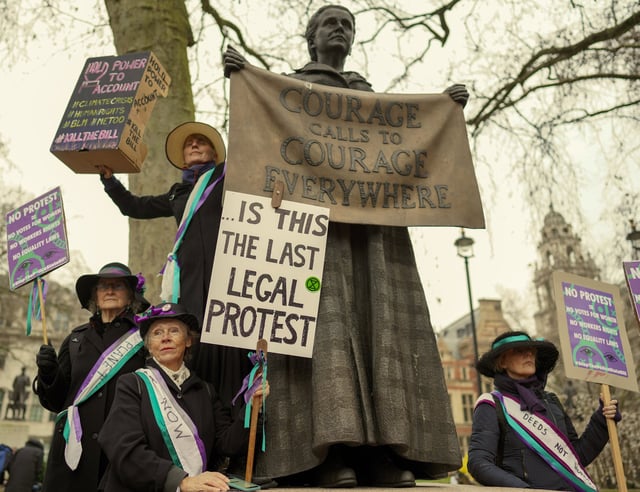
For almost 20 years, Positive Pie has been a fixture in downtown Montpelier, Vermont. But now, the restaurant and pizza shop, owned by Melissa Whittaker and her husband Carlo, is just getting back on its feet following catastrophic flooding last July. The flood blanketed Vermont’s capital city with several feet of Winooski River water that spilled over its banks. Climate scientists warn that increasingly heavy rainfall is a consequence of climate change caused by the burning of fossil fuels.
Floodwater inundated Positive Pie’s entire basement and swamped the first floor. When she and her husband could finally access the basement, days after the flood, Whittaker described the scene as “like a zombie horror movie.”
“The pressure from the river water coming through the basement came so hard that it actually blew out the basement wall,” she said. “That centrifugal force caused our walk-in cooler to basically explode, and that sent pizza dough everywhere. So when the water receded there was, like, pizza dough hanging from the basement ceiling, the pipes, the walls.”
Positive Pie reopened fully in April, but Whittaker said that rebuilding will cost roughly $700,000, not counting making up for lost revenue and product losses. “It’s really been devastating to our finances and our mental health,” she said.
Many Vermonters suffered damages–both economic and emotional–from last summer’s flooding that ravaged the state. “We’re looking at huge budgetary revenue holes for municipalities. We have businesses that are just barely hanging on,” said Anne Watson, a Vermont state senator who served as mayor of Montpelier from 2018 to 2023. “People are still very much in pain.”
The total costs from the disaster are estimated at more than $1 billion—but Vermont recently enacted a world-first law to make fossil fuel companies pick up some of the tab.
Known as the Climate Superfund Act, the landmark bill aims to hold some of the largest oil and gas producers liable for climate-related costs incurred by the state. Republican Governor Phil Scott allowed the bill to become law without his signature on May 30, making Vermont the first state in the nation to adopt this kind of polluter pays climate legislation.
Legal experts say the law’s passage is a historic moment for climate accountability. As several environmental law professors wrote in a March letter to the state’s Senate Judiciary Committee, the bill “would, for the first time in the United States and arguably anywhere on the planet, unmistakably establish the responsibility of fossil fuel companies to help cover the monetary costs of adapting to the harmful impacts of climate change.” Christophe Courchesne, director of the Environmental Advocacy Clinic at Vermont Law and Graduate School and one of the authors of that letter, called it “very significant” that Vermont took this step of getting the law passed.
“This is a real first,” he said.
And New York appears to be not far behind. Just a week after enactment of Vermont’s bill, the New York Assembly passed New York’s version of this legislation, which had already passed the state’s Senate. If Governor Kathy Hochul signs it into law, New York will join Vermont in leading what climate advocates say is a new era in efforts to hold Big Oil accountable. Several other states, including California, Massachusetts, and Maryland, are considering similar climate cost recovery legislation.
This model of legislation targets upstream extractors and refiners of fossil fuels, companies like Exxon, Shell, and Chevron, which are at the base of the supply chain. Importantly, the text of the Vermont law does not name any specific fossil fuel giants. Rather, it is now up to the Vermont treasurer and the Agency of Natural Resources to identify the companies that are the so-called responsible parties—fossil fuel companies that generated more than 1 billion tons of CO2-equivalent emissions between 1995 and 2024—to calculate the costs to the state, and to divvy these costs among the companies based on the share of emissions attributable to each entity. Once these assessments are complete—a process that could take two to three years—the state would essentially bill the companies, with payments due within six months. The payments then go into a newly-established fund to be used for climate adaptation and resiliency projects and for climate-related loss and damage reimbursements.
As the name suggests, Vermont’s Climate Superfund Act is modeled on the federal Superfund program, which makes polluters responsible for paying for the cleanup of heavily contaminated sites. Like the Superfund law, Vermont’s legislation imposes strict liability on responsible parties. And while it would be the first time that such liability would extend to fossil fuel companies in the climate context, the concept of holding corporate polluters liable is not novel in environmental law.
“If you make a mess, you clean it up,” Johanna Miller, energy and climate program director at Vermont Natural Resources Council, said. “It’s pretty simple stuff at its core.”
Watson and several other legislators introduced Vermont’s climate superfund bill in January this year. In a matter of only five months, a single legislative session, it became law.
Both Watson and Martin LaLonde, a Vermont state representative and another lead sponsor of the bill, said the flooding meant that climate action and resiliency were front of mind for them and their colleagues. “That certainly greases the skids for getting legislation through,” LaLonde said.
The floods were so damaging that political will on the bill even extended beyond party lines. “Climate change affects us all regardless of our political beliefs,” Watson said.
Another factor in the speed of the bill’s passage, according to LaLonde, was that Vermont legislators had an existing body of work – research and commentary from legal scholars and experts as well as similar legislative proposals in other states like New York – to help guide them. “We didn’t start from scratch,” he said. “That allowed us to really do this much more nimbly and quickly than I think otherwise would have happened.”
There was no apparent lobbying pressure or obstruction from the fossil fuel industry, either. The American Petroleum Institute declined to testify in front of the legislature, instead expressing its strong opposition through a memo to lawmakers.
“My guess is that [Big Oil lobbyists] have been watching, they weighed in with their memo, and their pockets are deep and they’re going to fight it in the courts,” Miller said. “They’re just holding their fire as they say.”
“This punitive new fee represents yet another step in a coordinated campaign to undermine America’s energy advantage,” API spokesperson Scott Lauermann said in a statement on the new law. He criticized state lawmakers for opting “to pass a bill designed by activists to further their own interests.”
The law is “not about exacting punishment,” LaLonde said. “It’s about reimbursement for damages. Rather than taxpayers having to pay for those damages, the companies that profited from the product should have to pay for it.”
Before polluters are forced to pay up, however, Vermont will have to successfully defend the new law from Big Oil’s expected legal challenges. The state’s attorney general, Charity Clark, told legislators that she is prepared to “proudly defend this bill” in court. Although there are a number of grounds on which the industry will likely try to challenge the legislation, including constitutional and federal preemption arguments, state lawmakers say they thoroughly considered these legal issues with the help of legal scholars who testified in support of the bill as well as legislative counsel.
“We studied this pretty carefully,” LaLonde said. As a lawyer by training who spent 12 years at the Department of Justice in the Environment and Natural Resources Division, he said he “was also able to on my own evaluate our defenses. And we feel pretty good about that. Are we ultimately going to win? That’s hard to tell.”
Vermont is already going up against Big Oil in court. The state filed a lawsuit in 2021, alleging that companies including Exxon Mobil, Shell Oil Company, and Sunoco LP violated Vermont’s Consumer Protect Act by misleading the public on climate change. Vermont’s suit is one of dozens of cases brought by states and municipalities in recent years accusing major fossil fuel entities of lying about climate change for decades and deceptively marketing and promoting their product. These cases are slowly winding their way through the courts. Legal experts say the polluter pays climate legislation should not conflict with this litigation.
“This is a very different approach,” LaLonde said of the legislation targeting Big Oil versus the litigation.
Patrick Parenteau, a climate law expert and professor emeritus at Vermont Law and Graduate School, said the two approaches are distinct yet complementary, and that both will ultimately face scrutiny from the US Supreme Court. It is there, where some justices have recently signaled strong support for states’ rights to legislate, that he said the climate superfund-type legislation might have a slight advantage. And the grounds for liability in the legislation is also more straightforward, he said.
“One of the advantages to Vermont’s approach is you don’t get into that messy business of did [fossil fuel companies] lie and did it matter,” Parenteau explained. “It’s straight up: you’ve polluted, and you’ve caused damage, and here’s the bill.”
Experts say that the legislation’s legal challenge could get very expensive, and could drag on for years in court. Still, proponents of Vermont’s action say it is a worthwhile pursuit and that other states and jurisdictions will hopefully follow Vermont’s lead.
“Companies that have contributed to climate pollution and profited from the sale of what is a dangerous product, known for a long time to be dangerous—those companies will be held accountable for those costs by governments around the world in years to come,” Courchesne said. “That’s the message of this Vermont law.”
Whittaker said she is “hugely, hugely supportive” of Vermont’s attempt to hold Big Oil liable for climate costs.
“To get help, especially from companies that have a ton of money and that lied about their effects on global warming, I feel like that would be so incredible,” she said.
(Feature photo image: Flooding on main street in Montpelier, Vermont, July 11, 2023. U.S. Army National Guard photo by Sgt. Denis Nunez. Accessed via Wikimedia Commons)






